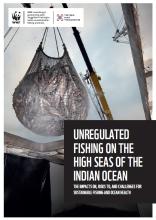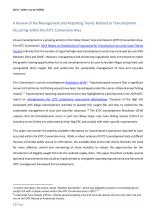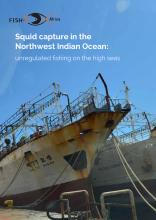Unregulated Fishing on the High Seas of the Indian Ocean: The impacts on, risks to, and challenges for sustainable fishing and ocean health
This report presents the first study to use automatic identification system (AIS) data to examine the risks of unregulated fishing to ocean health. It also addresses the challenges faced by decision makers and regional management bodies to tackle unregulated fishing on the high seas of the Indian Ocean within the context of a failure to date to sustainably manage this global commons. The study discusses two institutional features that contribute to unregulated fishing on the high seas of the Indian Ocean: the gaps in spatial areas of competence and the gaps between the groups of species covered by regional fisheries management organisations (RFMOs).
Language


